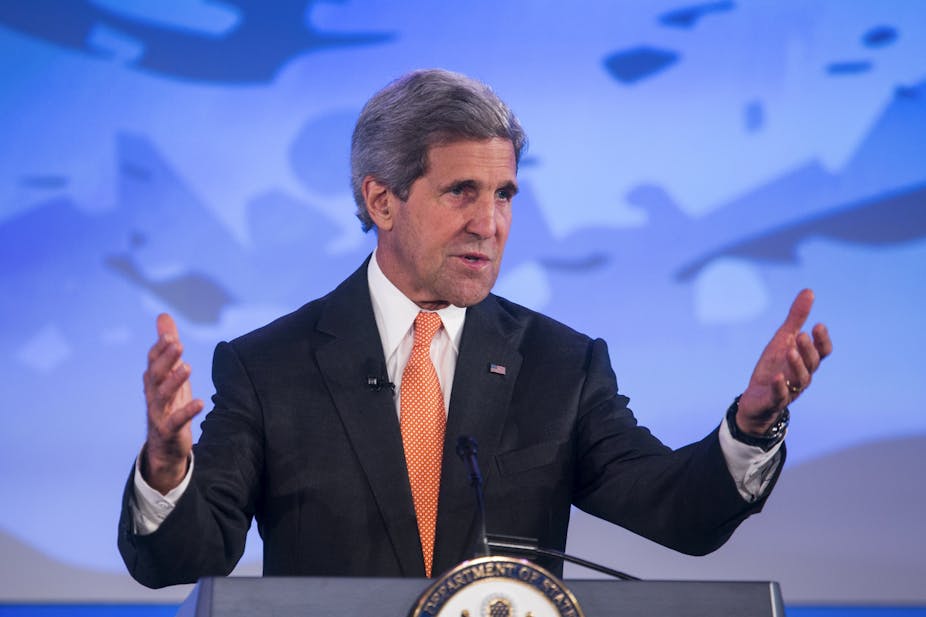As it had already been cancelled once, due to the US government shut-down last October, the latest developments in Iraq made it seem likely the Our Ocean conference, organised by the US State Department, could be cancelled again. Or that US Secretary of State John Kerry would make brief introductory remarks, and then not be seen again, as is often the case when senior government ministers attend science conferences.
While he wasn’t present throughout, Kerry dominated the conference earlier this week in Washington DC. And the conviction of his speeches – given at the start and the end, and over lunch and dinner too, exhorting the world’s decision-makers not just to hear the science, but to act on it – gives rise to optimism.
The focus of discussions were three of the most serious problems that threaten the ocean: over-fishing, pollution and acidification. None is an intractable problem, given sufficient national and international political will. Improve fishery regulation and traceability, don’t throw rubbish in the sea, and at least make a start on changing energy policy to reduce – and eventually halt – the ecological impact of ocean uptake of CO2.
So was it a science conference at all? Not in the usual sense of researchers presenting information for discussion by fellow experts, with few others understanding more than the first couple of slides. It was made clear to those scientists invited to speak that communication was crucial: don’t assume any knowledge of the field, and construct a coherent and persuasive narrative in no more than five minutes. Only a few slides that included graphs were allowed, and they had to be explained in less than ten words.
Three UK experts were invited to speak: Richard Thompson on marine plastic litter, along with me and Carol Turley discussing ocean acidification. Carol explained the chemistry, scale and unprecedented speed of ocean acidification; I argued the need for more data, on a worldwide basis, to improve understanding, short-term forecasting and long-term projections: what you don’t measure, you can’t manage. The audience was made up of a very wide spectrum of decision-makers, including heads of state, ministers and other government representatives from around 80 countries, and 400 delegates from industry, charitable foundations, NGOs and UN bodies.
US President Barack Obama made his contribution to the conference on video, announcing by executive decree new regulations to counteract illegal, unregulated and unreported fishing in US waters, and also the establishment of what is likely to be the world’s largest Marine Protected Area in the Pacific.
A flurry of announcements and commitments followed. Leonardo diCaprio told the conference how he has always been inspired by the ocean, and pledged an extra US$7m for marine conservation projects. The President of Palau, Tommy Remengesau, announced that 80% of his country’s Exclusive Economic Zone, around 500,000km2 would become a marine sanctuary, phasing out commercial fishing. The Norwegian Foreign Minister, Børge Brende, said it was time to “stop re-arranging deckchairs on the Titanic”, and committed US$1 billion for climate change mitigation.
Proportional to population, the US equivalent spend to Norway’s would be US$68 billion. Kerry didn’t go that far, but did newly commit around US$10 million over the next three years for projects tackling ocean acidification, through NOAA and the Ocean Acidification International Coordination Centre in Monaco. Particular emphasis would be given to helping the development the Global Ocean Acidification Observing Network, in partnership with other national governments, intergovernmental bodies and The Ocean Foundation. Such support comes at a crucial time for the network, established just a year ago at an international workshop in St Andrews.
Unfortunately no UK government minister attended the conference, nor were any new UK national marine initiatives announced. Sir David King, the Foreign Office special representative for climate change, did however remind the conference that four years ago the UK established the world’s largest no-take marine protected area in the waters of the British Indian Ocean Territory, as well as a major reserve in the Southern Ocean, and pointed out the challenges in enforcing fishing bans.
Will the conference inspire the UK government to make more rapid progress on marine protection around Britain? According to Professor Callum Roberts, such progress is badly needed: few tangible benefits have yet been seen from Britain’s marine conservation zones. But let’s be optimistic. Sound travels faster and further in seawater than in air, so by now the good news arising from this conference should be known throughout the marine realm, with the possibility of even better news to come.

